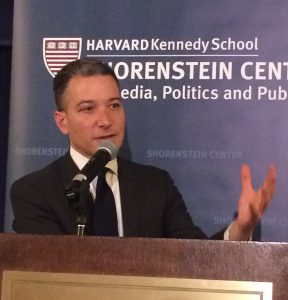
By Wei Luo, MPP 2017
On October 13, the Shorenstein Center hosted Jeffrey Rosen for the Richard S. Salant Lecture on Freedom of the Press. Mr. Rosen is the President and CEO of the National Constitution Center and a Professor of Law at George Washington University. Speaking at the Charles Hotel’s Kennedy room, he discussed the future of free speech in a digital world.
Mr. Rosen noted that technology companies such as Facebook, YouTube, and Twitter are effectively functioning like media companies, wielding immense influence over the public sphere. Given that 400 hours of content are posted on YouTube every minute and 1 billion people use Facebook every day, these companies face an unprecedented challenge in upholding First Amendment values while balancing individual dignity. In the past, companies reviewed user content manually. Now, they are moving toward automated algorithmic review, which “can pose grave threats to free speech.”
The gold standard for free speech, Mr. Rosen believes, was established by the Supreme Court Justice Louis Brandeis (1856-1941). Characterizing the standard as the “What Would Brandeis Do” (WWBD) rule, Mr. Rosen explained that free speech should only be limited when it poses an imminent danger, such as when it directly incites one person to act violently against another. The American democratic system is rooted in Athenian and Jeffersonian ideals of free speech, which “believes in the power of reason” as the best remedy for evil counsels.
One major challenge to this free speech standard is that technology companies operate internationally and face different legal and cultural traditions. “The European tradition favors dignity over liberty,” Mr. Rosen said, while the American tradition favors liberty, property, and a marketplace of ideas. Pushed by commercial pressures, technology companies in Europe have moved toward the notion of a “well ordered society” in which dignity trumps liberty. For example, Google as recently acceded to “right to be forgotten” rules in Europe, which could deny to European citizens large pools of information.
Another major challenge to the Brandeisian free speech standard is that digital platforms are susceptible to echo chambers that reinforce existing viewpoints. In the absence of counter-speech, public reason is hijacked by mob rule. Mr. Rosen believed that Justice Brandeis would have been nervously optimistic about today’s digital platforms, and suggested that perhaps government would ultimately bear responsibility for establishing guidelines for free speech online.
Ending on a cautious note, Mr. Rosen said that “the values of consumers are not the same as the values of citizens,” so Facebook, Google, and Twitter “should not be safe spaces, but should be democratic spaces.” To govern this digital democratic space, Mr. Rosen concluded that technology companies should adopt the constitutional standards of free speech established by Justice Brandeis nearly a century ago.
